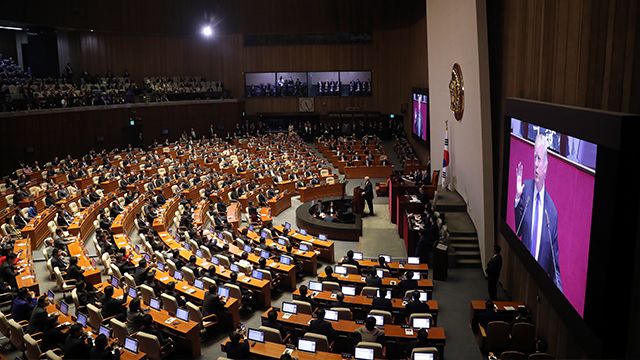Special to WorldTribune.com
 By Donald Kirk
By Donald Kirk
WASHINGTON ― The road to peace and reconciliation on the Korean Peninsula is so full of potholes and pitfalls, twists and turns, that it’s impossible to imagine where and how the process will end.
Take President Donald Trump’s speech to the U.N. General Assembly a year after he was denouncing Kim Jong-Un as “little rocket man” before the same august forum of the world’s movers and shakers.

Did he talk about a “peace declaration” that President Moon Jae-In and Kim both think would be just wonderful? Did he say it was time to replace the armistice that ended the Korean War with a “peace treaty,” as the North Koreans would love?
The answer to both those questions is no.
Okay, he has indeed said he would like to meet Kim again in the near future, and we may be sure Kim will want to wind up another talkfest with a statement formally ending the Korean War. But will Trump fall for it? Or he will prefer to ramble on, as he did at the UN, about Kim’s “courage …. for the steps he has taken” to bring about denuclearization?
Neither Kim nor Moon could have been overjoyed about those remarks, which were really a pro forma repetition of the stuff he’s been saying ever since the Singapore summit in June in which he and Kim signed off on that infamously vague statement about “complete denuclearization.” Kim must not have appreciated the next sentence in which Trump then said, “Sanctions will stay in place until denuclearization occurs.”
The significance of those words was largely lost on the media, obsessed with Trump’s remarks on just about everything else, notably his tough talk on Iran and China. To superficial appearances, it seemed that Trump was just patting himself on the back as he’s been doing ever since Singapore for resolving the nuclear issue. Kim wants both a peace declaration, which would lead to a peace treaty, dissolution of the U.N. Command and withdrawal of U.S. forces, and an end to sanctions, which are a serious nuisance for the North even if both China and Russia are failing to enforce them.
Trump at the U.N. offered neither of these concessions to North Korea, which has demanded “corresponding measures” before doing much about its nukes and missiles, much less the facilities for making them. By skipping over them, he may have been following the advice of his national security adviser, John Bolton, and possibly his secretary of state, Mike Pompeo.
Considering North Korea’s strategic aims, you have to wonder if Pompeo will get very far on his next mission to Pyongyang in which he is to lay the groundwork for a second Trump-Kim summit. Moon may be saying Kim talked seriously to him when they met in Pyongyang about the details of denuclearization, but it’s beyond imagination to dream that Kim is going to say, Ok, you can have our nukes. If Pompeo gets to see Kim again, he would be lucky to get an inventory of all the North’s nuclear and missile sites.
Some analysts still think, though, that Kim can fool Trump into going along with his demands despite the advice of Bolton, Pompeo and others.
Bruce Bechtol, author of numerous books and articles on North Korea’s military activities, wonders if Trump has learned from the breakdown a decade ago of efforts at getting North Korea to come to terms in six-party talks hosted by China, including the two Koreas, the U.S., Japan and Russia. While those talks were going nowhere, the North was honing skills in cyber warfare and setting up systems for transferring funds through dummy companies into foreign accounts.
Moon, however, made concessions to Kim that will be difficult to overcome. Probably the most serious was the agreement to establish a no-fly zone on both sides of the demilitarized zone and withdraw from guard posts on either side of the Military Demarcation Line, removing the ability to fly reconnaissance missions or properly guard against signs of invasion.
The deal works totally in North Korea’s favor. “They are an offensively postured army,” says David Maxwell, a retired U.S. army colonel, now with the Foundation for the Defense of Democracies. “The South Koreans are defensively postured. You’re taking away their defense without taking away any of their offensive capability.”
That’s assuming, realistically, the North Koreans would not withdraw their massed troops and artillery pieces above the Demilitarized Zone. That’s a topic, like so much else, that has yet to come up in North-South talks. And even if it did, who’s stupid enough to think the North Koreans would agree on inspections to be sure? Hopefully not Trump.
Donald Kirk has been covering the standoff between the two Koreas for decades
